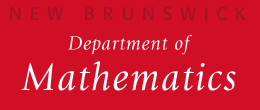NOVEMBER, 2000: Saharon Shelah (Hebrew University, Jerusalem, Israel and Rutgers University, New Jersey) has been awarded the János Bolyai International Mathematical Prize of the Hungarian Academy of Sciences, which consists of a medal and an award of $25,000. The award was presented on November 4, 2000 in a ceremony in Budapest, Hungary.
This award was established in 1903 by the Hungarian Academy of Sciences in honor of János Bolyai, co-discoverer of non-Euclidean geometry, and was presented to H. Poincaré in 1905 and to D. Hilbert in 1910, after which various historical events, beginning with the first World War, forced its interruption. The Academy has decided to renew the award, and Professor Shelah is the first recipient in modern times. In keeping with the original plan, the prize will be awarded every five years to the author of the best mathematical monograph containing original research which has been published in the previous ten years.
The monograph for which Professor received the award is his work Cardinal Arithmetic, published by Oxford University Press in 1994, in which he presented his profound and sophisticated pcf theory, a new approach to cardinal arithmetic. This work attests to his view that there is an essential core of set theory unaffected by the famous independence results of the last four decades, in which a great deal of work remains to be done, His applications of pcf theory, many of which are given in his monograph, constitute a breakthrough in many areas of pure, as well as applied set theory.
In his 700-plus papers and several books Professor Shelah has had an unparalleled influence on modern set theory and model theory. His solutions to deep and longstanding problems and his independence techniques forever changed the landscape of set theory; this is even more true in model theory where his concepts and methods have completely revolutionized the area. He also solved a number of famous problems arising in other branches of mathematics, such as algebra, combinatorics, and topology.








